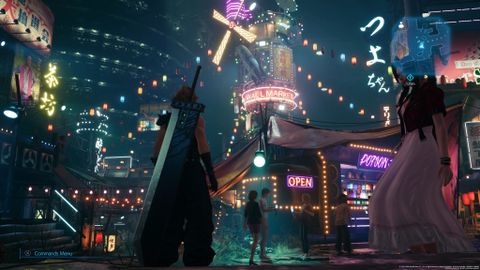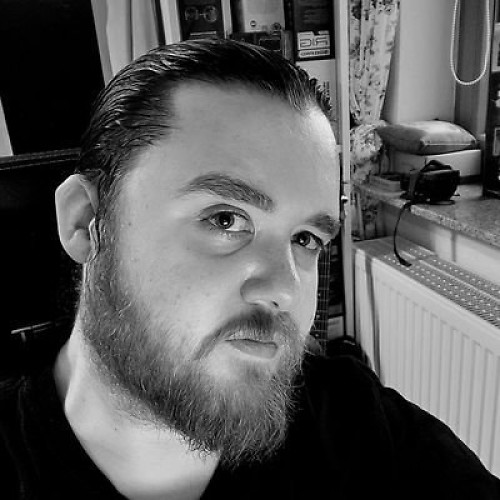Android Central Verdict
Bottom line: A masterpiece of nostalgic goodness, here to top the RPG pile once again.
Pros
- +
Satisfying and deep combat
- +
Stunning boss battles
- +
Great characters, both new and returning
- +
Excellent performance and visuals
- +
40 hours+ campaign
Cons
- -
Red XIII wasn't playable, grr
- -
"Hard" difficulty should be unlocked from the start, as "Normal" isn't too challenging
Why you can trust Android Central
As I write this, I have quite literally just finished Final Fantasy VII Remake, which has been in development at Square Enix for several years.
Based on the legendary title of the same name from 1997, a potential Final Fantasy VII Remake had been rumored for well over a decade before finally breaking cover at E3 back in 2015. The fact that it's finally here, now, fully realized in 2020 feels almost like a dream.
Final Fantasy VII's remake is virtually without precedent. While we have seen games remade over the years, arguably none were as beloved, as iconic, and as potentially large and complex as Final Fantasy VII, which was in its own right a sprawling, multi-faceted RPG of its heyday. I personally regard Final Fantasy VII on the PlayStation 1 as the game that got me into gaming, elevating it from a toy to something I saw more of a passion or an art form.
It is with that in mind that I was immediately skeptical of Final Fantasy VII Remake. I've been disappointed with the franchise's recent efforts, from the clunky combat and odd story of Final Fantasy XV, alongside the general incoherency of Final Fantasy XIII. Surely FFVII Remake was destined to be something of a cash-in, rather than a true homage that pays respect to a true legend. Thank the stars that I was wrong.
What Square Enix has achieved with Final Fantasy VII is nothing short of staggering. Not a single stone was left unturned. The team meticulously included virtually every detail from the Midgar setting I could possibly remember, along with many that I didn't, while including new ones that weave beautifully to complete the whole.
It's obvious this is the product of a team that not only gets the essence of Final Fantasy VII but also gets the love people have for this fabled title.
This is Final Fantasy VII Remake, which will surely be remembered as one of this generation's most incredible RPGs.
Final Fantasy VII Design, performance, and audio
As a remake, Final Fantasy VII had a lot of source material to draw from when it came to art direction, while also being constrained by fan's expectations and decades of nostalgia and hype. Despite the challenges, Square Enix pulls through, elevating the iconic franchise to all-new heights in the process.
Final Fantasy VII aims high and consistently delivers.
With 4K resolution, stunning HDR lightning, and industry-leading effects and combat choreography, Final Fantasy VII aims high and consistently delivers. The game is light on loading sequences too, although there is the gratuitous use of artificial choke points that slow Cloud down so new assets can stream in. I played on the PlayStation 4 Pro and didn't see a single instance of frame rate struggles, hitching, screen tearing, or any other type of performance degradation. The trade-off is, of course, immersion. You're very rarely taken away from the experience, but I'll take that over a loading screen where possible.
Fans of the original musical score are also in for a real treat, with piles of nostalgic tracks remixed and reimagined, but that also preserve the essence of the original compositions. Each area has a signature theme, complete with a battle theme that ramps up and down in intensity as the battles rage on. It is impossibly good.
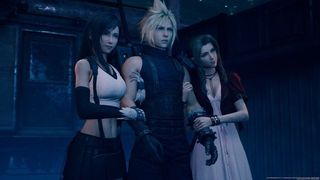
The game also has a few cheeky nods throughout to sound effects and other auditory cues from the original. Barret hums the victory theme for example, which is endearing. When awards season rolls around for video game music, I wouldn't be surprised if Final Fantasy VII cleans house.
However, it's in the set-pieces and character designs where Final Fantasy VII shines the most. Final Fantasy VII has a truckload of characters, monsters, and locations, and each one feels like they were a labor of love. The characters look like an amalgam of the cartoony silhouettes of the original, blended with the stylized realism from the movie Final Fantasy VII: Advent Children. The result is gorgeous, and engaging, and speaks to the imagination of everyone who experienced the original games.
Sure, some ambient NPCs lose some fidelity over their main character counterparts, and texture compression can be very aggressive at times, particularly in some of the more complex areas. When it comes to art and design, though, there's virtually nothing to complain about. They nailed it.
Final Fantasy VII Story delivery (spoiler-free)
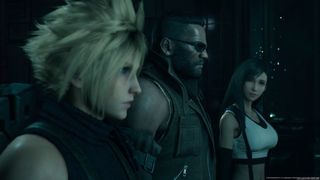
Final Fantasy VII has spawned movies, spin-off titles, and enjoys a massive fandom for its characters and plot threads. Remaking something as large as this has clearly been no easy undertaking, which goes towards explaining why the full tale will be told across multiple games, rather than one.
For this first installment, Final Fantasy VII Remake retraces the steps Cloud Strife made in the dystopic cyberpunk urban hell of Midgar. Despite being fully-voiced and expressive, with some truly incredible facial motion capture (wait 'til you see the evil scientist Hojo later on), somehow the game still captured the essence of the story delivery of the original. Without spoiling it for those who didn't play the original, and for those who want to avoid new plot details (and yes, there are new plot details), Final Fantasy VII tells the story of Avalanche, an eco-activism group that fights against Shinra Inc., which uses advanced technology to bleed the planet of resources to produce energy.
Midgar is something of a technocracy, governed by the company rather than a parliament or royalty. Everything is about money and power, with those who go against the grain finding themselves living life in the slums, beneath the steel plate that separates Midgar's over-city from the pollution that spews out of the energy reactors.
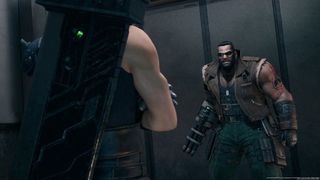
Cloud is an ex-SOLDIER, part of Shinra's elite forces, who has effectively gone rogue. He joins up with Avalanche as a mercenary to help them bomb some Mako energy reactors, putting a dent in Shinra's plans. As you might expect, things get messy quite quickly, and Cloud finds himself bound up in a bigger plot that has implications for the entire planet.
Despite being a small slice of the full story from the original, Square Enix went all-out recreating every detail, including every character, while sprinkling in new ones here and there. The new ones are no slouch either. The seedy slum entertainment hub Wall Market's new gangsters, like the burlesque Honeybee Inn club owner Andrea Rhodea, fit right in with the salacity and sleaze of the Vegas-like strip, while a trio of bumbling recurring bandits inject some slapstick comedy as you pass between sectors.
It even added more to Midgar, which was a comparatively small part of the original, told through blue text boxes and static backgrounds. It was all tied together with some, at least at the time, cutting-edge CGI cinematics, alongside award-winning music from Nobuo Uematsu. For Final Fantasy VII Remake, Square Enix beefed up and fleshed out the steel metropolis, taking the vast majority of those text-based conversations and turning them into fully-realized in-engine cutscenes, with truly jaw-dropping animation and art.
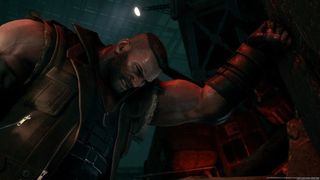
The game also explores some of the gray morality in Avalanche's eco-terrorism, as well as some of the character's reservations about their actions. The new elements came across as a breath of fresh air, replacing nothing, and only adding to the overall spread.
Plot details that seemed unimportant in the original end up being fleshed out and more realized in this one, too, giving minor characters far more depth in the process. The emotional impact of previously relatively inconsequential moments from the original gets dialed-up into major, pivotal moments in this one, with added benefits from emotional character acting.
It's tough to really go into the story in-depth without getting spoiler-ish. Truly, though, despite knowing almost everything that was going to happen, no game since The Witcher 3 has given me goosebumps through its plot delivery as frequently as this one.
Final Fantasy VII Gameplay
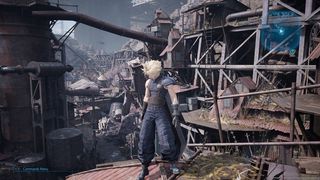
Final Fantasy VII's new combat system was perhaps something I had the most reservations about as a long-time fan of the franchise, but I grew to love it.
Final Fantasy VII recreates elements of the "ATB" system from the original, weaving it remarkably well into something more reminiscent of the impressively choreographed fight sequences from Final Fantasy VII: Advent Children. It's impressively intuitive, and probably the best combat system the franchise has spawned in the best part of a decade.
It's probably the best combat system the franchise has spawned in the best part of a decade.
In the game you get access to four playable characters, up to three at any one time in your party, depending on the story. Barret wields a gun for an arm, while Tifa beats enemies down with martial arts. Of course, Cloud has his iconic claymore, and Aerith wields a staff with light magic. You can augment and tailor each character's playstyle, typically favoring magic, regular attacks, or a combination of the two.
In combination with the new stagger system, Final Fantasy VII's combat is as satisfying as it is customizable, without being pigeonholed into specific roles at any given time.
Different types of gear yield different types of bonuses, allowing you to specialize your characters in different ways. Weapons also "level up" and gain additional bonuses. If you like a particular weapon skin or style, you can ensure it remains a competitive option by setting up your Materia and other gear pieces around it.
Speaking of which, Materia is Final Fantasy VII's magic system, which also forms a major part of the game's plot. Socketing Materia into your gear will grant you additional abilities and sometimes bonuses. Unfortunately, slots are finite, forcing you to make choices about what to use and when.
For my playthrough, I made Cloud a bit of a hybrid, able to use a bit of magic while emphasizing his melee attacks. Each character gets a range of unique abilities alongside their usable Materia. Cloud can melee attack using his sword, for example, while Barret is adept at dealing with foes at a range. Regardless of how you set up your characters, you can always take advantage of weaknesses in enemies. Cloud's sword attacks will still deal monstrous amounts of damage to a staggered enemy, even if you've designed him to be more of a caster. Some Materia even have additional benefits beyond simply dealing damage. Aero is wind magic, for example, and even if Cloud's magic attack is weak, Aero will still pull enemies towards you, helping you to more quickly gain ground. Weaving attacks between blocking and dodge rolling is key to victory, alongside learning enemy attack patterns and weaknesses.
Where Final Fantasy VII gets really interesting is in its boss fights. Not only are they incredible set-pieces that showcase truly wonderful designs, but they also weave seamlessly with in-engine cutscenes in a way that feels unique and elegant. Many games have tried to do something like this, even past Final Fantasy games, but this feels like a cut above. I thoroughly expect Final Fantasy VII to become a trendsetter in this regard. Summoning Materia feeds into this too, which allows you to call forth some of the franchise's legendary spirits to aid you in major boss battles, resulting in spectacular showcases of flame and ice.
Some of the boss battles will have you agape with awe
The overall design of the combat system is slick and satisfying. The combat makes you feel like you're the choreographer of a real-time big-budget anime movie. And honestly, I'm only scratching the surface here.
Finding all of those boss battles and those gear pieces will require a lengthy journey through Midgar's winding slums, monster-infested sewers, and rusty scrap heaps. The world is laid out similarly to the original, with small population hubs bustling with NPC activity, commenting on the current story beats while going about their daily business. Some may offer side-objectives that take you into some of the game's more dangerous areas, populated with monsters driven mad or mutated by the Mako pollution. Pushing ahead with the story may prevent you from accessing some of these side-objectives in the future, but upon completion, you're able to return to any previous chapter to tie up any loose ends or hunt down collectibles. FFVII is a beefy game, which offered me 42 hours of playtime for completing every quest and side-objective. If you speed through the main story ignoring everything else, you're still probably looking at around 25-30 hours.
Even while gunning for every quest, the game had great pacing between slower, story-driven sequences and jaunts through enemy-strewn dungeons, which often culminate in a boss battle from the game's returning cast. I don't want to spoil surprises, but Final Fantasy 7 is brimming with boss battles, accompanied by virtually every enemy monster from the previous Midgar experience, at least in some way. Some of the game's unique regular enemies from yesteryear return, too, all elevated to boss status. I don't want to spoil surprises, but some of the boss battles will have you agape with awe.
Most of the sidequests were fairly simple, and primarily tasked you to go somewhere and fight something, but all of those fights were so satisfying that it never felt like a chore. Some of them came with compelling rewards too. Notably, the citizens of the quest hubs remark upon your victories. Kids in the Sector 5 slum, for example, start running around with cardboard swords trying to emulate Cloud if you help them, which shows a warm attention to detail. The game is full of careful, thoughtful details like that that will make you feel more connected than ever to Cloud's story.
I will say that I have some reservations about what Square Enix may be planning to do with the episodic format of the game and how that might impact key plot elements from the original, but it didn't detract from my experience. Right now, I'm just desperate for more.
Final Fantasy VII Should you buy it?
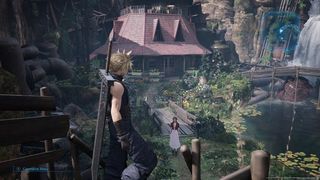
Yes. Final Fantasy VII Remake is quite easily one of the best RPGs of this generation, with endlessly satisfying combat, stunning art in a large world, a dazzling cast of characters, and heaps of nostalgic goodness wrapped neatly in a fulfilling RPG package.
Final Fantasy VII Remake is quite easily one of the best RPGs of this generation.
What really crowns Final Fantasy VII is the meticulous detailing, which is in service of the game's fans. Every quirky little feature, mini-game, oddball conversation, and side-character got at least some time to shine, which shows a level of appreciation few other remakes have even tried to reach for. It also speaks a little to things that we've lost as game budgets have ballooned over time — the finer (maybe stranger) details that give a game its character, outside of the loops that keep us "engaged."
It has simply been amazing to retread this legendary game through the lens of a powerful modern gaming system and is quite honestly something I never thought I'd see happen.
5 out of 5
Even if you haven't played Final Fantasy VII before, this is heaps and bounds the best the franchise has been in years. The combat system is fun and functional instead of just flashy, and the plot and characters are relatable, rather than overly philosophical or metaphysical.
Final Fantasy VII defined a generation back in 1997, and it has returned to do so again in 2020.
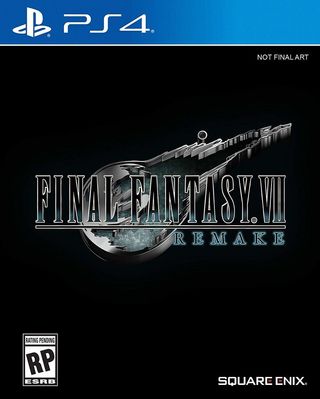
A stunning achievement
Final Fantasy VII triumphs in what is a clear labor of love, well worthy of any RPG fan's attention.
We reviewed Final Fantasy VII Remake on a PS4 Pro, using a copy provided by Square Enix.
